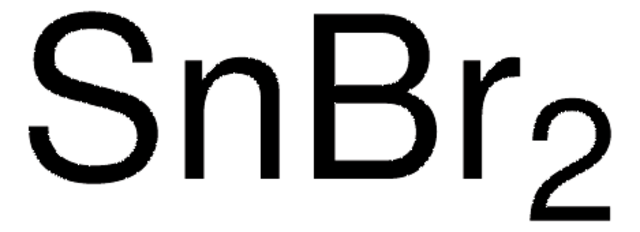452335
Tin(II) chloride
anhydrous, powder, ≥99.99% trace metals basis
Sinonimo/i:
Stannous chloride
About This Item
Prodotti consigliati
Grado
anhydrous
Livello qualitativo
Tensione di vapore
33 hPa (~429 °C)
Saggio
≥99.99% trace metals basis
Forma fisica
powder
Impiego in reazioni chimiche
reagent type: catalyst
core: tin
pH
2.18 (20 °C)
P. eboll.
606 °C
652 °C (lit.)
Punto di fusione
246 °C (lit.)
Solubilità
water: soluble 1780 g/L at 10 °C
Stringa SMILE
Cl[SnH2]Cl
InChI
1S/2ClH.Sn/h2*1H;/q;;+2/p-2
AXZWODMDQAVCJE-UHFFFAOYSA-L
Cerchi prodotti simili? Visita Guida al confronto tra prodotti
Categorie correlate
Descrizione generale
Applicazioni
Accessorio
Avvertenze
Danger
Indicazioni di pericolo
Classi di pericolo
Acute Tox. 4 Inhalation - Acute Tox. 4 Oral - Aquatic Chronic 3 - Eye Dam. 1 - Met. Corr. 1 - Skin Corr. 1B - Skin Sens. 1 - STOT RE 2 Oral - STOT SE 3
Organi bersaglio
Cardio-vascular system, Respiratory system
Codice della classe di stoccaggio
8B - Non-combustible corrosive hazardous materials
Classe di pericolosità dell'acqua (WGK)
WGK 3
Punto d’infiammabilità (°F)
Not applicable
Punto d’infiammabilità (°C)
Not applicable
Dispositivi di protezione individuale
Eyeshields, Faceshields, Gloves, type P3 (EN 143) respirator cartridges
Choose from one of the most recent versions:
Certificati d'analisi (COA)
Don't see the Right Version?
If you require a particular version, you can look up a specific certificate by the Lot or Batch number.
Possiedi già questo prodotto?
I documenti relativi ai prodotti acquistati recentemente sono disponibili nell’Archivio dei documenti.
I clienti hanno visto anche
Articoli
Silylethyne substitution offers an opportunity to tune solubility for application-specific needs and self-assembly for electronic performance and has yielded semiconductors with excellent device performance.
Il team dei nostri ricercatori vanta grande esperienza in tutte le aree della ricerca quali Life Science, scienza dei materiali, sintesi chimica, cromatografia, discipline analitiche, ecc..
Contatta l'Assistenza Tecnica.







